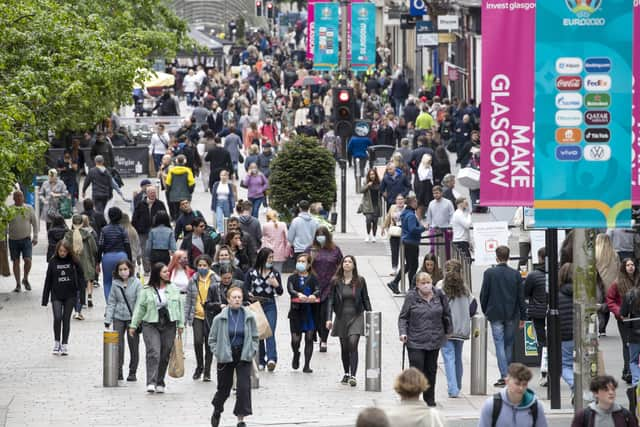Living in Glasgow, it’s hard to get excited about COP26 - Stephen McIlkenny
However, something about COP26 feels different.
For all the politically and culturally important events the city has seen, there is undoubtedly a sense of dread amongst many living in Glasgow ahead of the climate summit.
There can be little doubt that a meaningful climate change charter associated with Glasgow and Scotland would be a source of pride for the nation, and many cling on to the hope that a “Glasgow Agreement” similar to the 2015 Paris Climate Agreement can be a seismic moment in human history. But with uncertainty over whether any major deal will be struck, it is not worth the upheaval to transform the city for two weeks.


Advertisement
Hide AdAdvertisement
Hide AdCountries are required under the Paris Agreement to update their national climate action plan every five years and for that very reason COP26 could be monumental. Although in the grand scheme of things, a little disruption is a price worth paying to solve the climate crisis, for those in and around Glasgow, COP26 is not being seen as a moment of hope but rather a gathering of inconvenience that is bringing the city to a standstill.
Travelling in and around the city is to become a nightmare with parts of Glasgow out of bounds for locals. Road closures are set to cause havoc for residents and workers, the M8 will be transformed from an essential transport route connecting Scotland’s largest cities to a glorified red carpet for Joe Biden, and we have not even got started on the threat of protests adding to travel woes.
Students, so soon back on campus post lockdown, face the prospect of two weeks learning from home once more, workers face a daily battle to get to their jobs on time, Glasgow Life is to close a number of schools, nurseries and tourist attractions, and simple tasks such as getting to and from the city centre will require forward planning and a list of road closures as long as your arm.
It is little wonder that despite its importance, there is a growing sense of ennui around COP26 for those living and working in Glasgow.
And this is not due to Scottish scepticism like some may suggest, or an anti-green agenda. After all, you can be keen on saving the planet without wanting the entire world's agenda on your doorstep. And it has nothing to do with the people of Glasgow being opposed to grand occasions. There was the widely lauded Commonwealth Games in 2014, Euro 2020 matches at Hampden this summer, and going back even further, the Glasgow Garden Festival in 1988.
But all of these events were fundamentally different to COP26. And all had a significantly different impact and legacy.
The Commonwealth Games saw hundreds of thousands cram into the city centre with businesses booming from an influx of tourism. Prior to the Games there was a regeneration project that transformed large areas of the city. Parts of the East End were left unrecognisable with new transport routes created and even the Athletes Village was repurposed as affordable housing.
The Glasgow Garden Festival of 1988 is now regarded as a catalyst that sparked a change in attitude to how the world viewed Glasgow, with European City of Culture status following two years later. Although there was not a huge legacy in the area from the Festival, it did signify a rebirth in the city that reshaped and saw a cultural renaissance for Glasgow. It could be argued the creation of the Glasgow Royal Concert Hall was directly from the cultural awakening sparked by the events in 1988 and 1990.
Advertisement
Hide AdAdvertisement
Hide AdWhich brings us to the major question. What is the legacy of COP26 for Glasgow?
While few can deny the importance the event may have on the future of the planet, it is easy to see why Glaswegians are not exactly thrilled about the conference.
The legacy and lasting impact on the city is almost non-existent. There are no bold regeneration projects that impact large swathes of the city. The areas hosting COP26 delegates are not being drastically transformed. New transport routes or systems are not being rolled out. COP26 delegates are to get a transport smartcard allowing them to access all ranges of public transport from buses (even the night buses), subways and trains, something that does not exist, and will not exist post conference for locals.
Many of the green projects being carried out in the city such as the charging hub at Duke Street, Spaces for People, lighting upgrades, housing schemes and Glasgow’s Smart Street whilst important, will not impact many. Although the future of our planet is vital and climate targets and global cooperation are crucial, many in Glasgow are feeling shortchanged. Despite green initiatives cropping up, for many, it is not enough.
A large number of the hugely significant events in Glasgow’s history have had a lasting impact on the city. Despite a degree of disruption from the events taking place, they left something tangible for the people.
Can the same be said for COP26?
While no one can deny the importance of the conference, is it really worth the chaos and disruption? While the legacy of COP26 may be great, and could have a profound impact on the future of the planet, for residents of Glasgow it serves as little more than a reminder that their city can be used as a playground for the elite whenever they see fit.
Stephen McIlkenny is Assistant News Editor at The Scotsman
A message from the Editor: Thank you for reading this article. We're more reliant on your support than ever as the shift in consumer habits brought about by Coronavirus impacts our advertisers.
If you haven't already, please consider supporting our trusted, fact-checked journalism by taking out a digital subscription.
Comments
Want to join the conversation? Please or to comment on this article.